“F*** you, Tarzan.” COMICS! Sometimes ‘Tis Pity She’s A Whore!
/In which I aimlessly amble around Howard Victor Chaykin’s recent series ‘Midnight of the Soul’ and see what strikes my fancy. No, really, even more than usual, I just sort of prattle on rather aimlessly and hope some kind of coherent point emerges. It probably won’t, but as I haven’t written it yet we’ll have to find out together. Take my hand, fellow stranger in paradise! Take my hand...
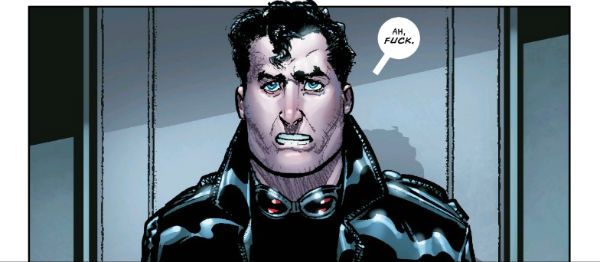 MIDNIGHT OF THE SOUL by Chaykin, Arbutov and Bruzenak
Anyway, this...
MIDNIGHT OF THE SOUL by Chaykin, Arbutov and Bruzenak
Anyway, this...
MIDNIGHT OF THE SOUL #1-5 Written by Howard Victor Chaykin Art by Howard Victor Chaykin Coloured by Jesus Aburtov Lettered by Ken Bruzenak Image Comics, $3.50 each (2016)
On one level ‘Midnight of the Soul’ is exactly the kind of comic everyone thinks Howard Victor Chaykin makes, but on another level it isn’t, and the abrasion between what you expect to read and what you actually read creates some smart sparks. I think. The success of Chaykin’s smuggling run in 'Midnight of the Soul' is aided no end by the fact he draws it and so, inevitably, it looks just like a Howard Victor Chaykin comic. This is the bit that misleads because the surface is flawlessly “Chaykin”. Obviously. What did you want, Dave McKean? The guy’s in his sixties, he’s not likely to be suddenly incorporating mixed media and sculpture into his work. Not when “Diagnosis: Murder” is on and there’s kosher Franks in the pan! Thus, the art is as Late Chaykin as Late Chaykin gets. And, yes, it breaks my heart too, but it is getting late in the Seasons of The Chaykin. But dry your eyes, o feral child, because he’s still with us, and he’s still delivering his pugnaciously suave art. Sure, some eyes will still be perturbed by the clip art that doesn’t quite gel and flinch at the odd lapse in positioning. I’m a Chaykin maniac but I’m not blind to his transgressions; there’s one panel of Patricia in a doorway that doesn’t work – at all, and he’s stuck himself with a motorbike image that doesn’t always suit the angle of his composition, and that precise image of a woman was in Satellite Sam, and that cop’s all out of whack with that barrier and, and, and, you know, we could carp all day, but what matters is that for the most part, most of it works. As your eye sweeps over it, as you read it, it works. If you sit and look at each panel, eh, not so much. But who’d do that? Whaddya think comics are? Art? Comics are for reading first and looking at second. 'Midnight of the Soul' is a VERY GOOD! read.
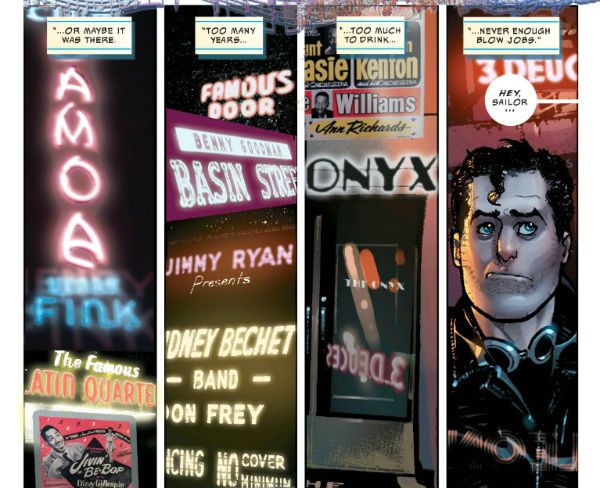 MIDNIGHT OF THE SOUL by Chaykin, Arbutov and Bruzenak
MIDNIGHT OF THE SOUL by Chaykin, Arbutov and Bruzenak
The occasional glaring visual infelicity aside, Chaykin definitely gets in a major artistic victory by resurrecting a sense of of New York as 'twas. While Arbutov’s colours remain a little too garishly lacquer-ish for my sedate tastes, they contribute enormously to this effect as well. The interiors of the dance halls and gin-joints are particularly noteworthy and Arbutov lays down some seriously hot pinks and cool greens. So, y’know, yay. The ‘50s being the Golden Age of The Billboard, omitting to mention the phantasmagoria of styles and fonts Bruzenak scatters as gloriously and as evocatively as the notes Gershwin throws over the opening of ‘Manhattan’(1979) would be a serious dereliction of duty. Bruzenak also subtly colour codes his speech bubbles so you know who is speaking even when they are “offscreen”. The big thing about Big Ken Bruzenak is that he never stands still (artistically, that is), and his stylistic evolution continues here with a pretty darn exciting and innovative mock 3-D lettering effect, used sparingly and effectively. Conjuring a particular time and a particular place from the past into the present via paper and ink is a very Chaykin preoccupation. The man’s rightly proud that locations in the original ‘Black Kiss’ are so redolent of ‘80s Los Angeles that readers’ noses start convulsing for coke in sympathy. In ‘Midnight of The Soul’ Chaykin (and Arbutov and Bruzenak) work a similar feat for ‘50s New York, though here it’s your stomach that rumbles for coffee and a doughnut, rather than your nose for Class ‘A’s.
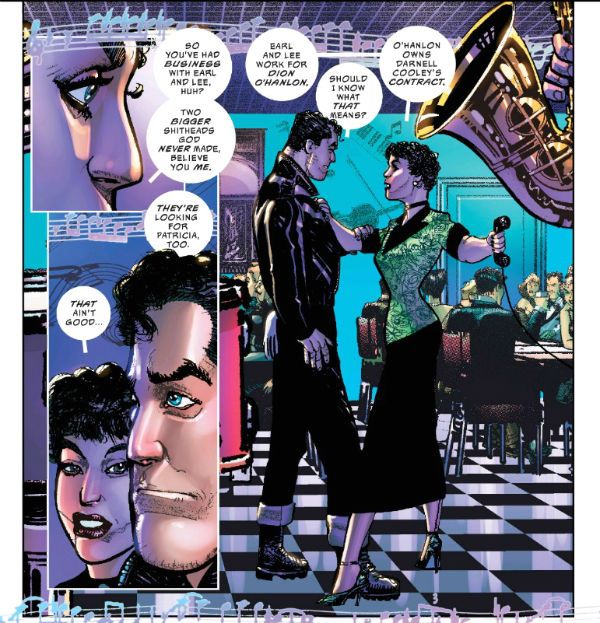 MIDNIGHT OF THE SOUL by Chaykin, Arbutov and Bruzenak
MIDNIGHT OF THE SOUL by Chaykin, Arbutov and Bruzenak
Not that the New York of ‘Midnight of the Soul’ is drug free. Au contraire, mon frère! On past evidence Chaykin’s not one of those selective amnesiacs who thinks the past was a magical Eden, to which the present is a disgraceful relative. If anything he’s prone to wallowing in the seamier side of things, and we’re not just talking about stockings there. And so it goes that Joel Breakstone’s search for his errant wife brings him up against a rash of rascals, a pair of gun slinging gunsels (in the correct sense of "catamites"), a saucy whip-smart dancer, a corrupt cop, and a boss man with a ginger flattop. This is after all, the ‘Midnight of The Soul’, so a certain sense of threat and moral conflict come with the territory. I mean, I could be wrong, but I believe the title alludes to ‘The Dark Night of the Soul’ (AKA ‘Noche obscura del alma’). That’s not because I am an expert on the poetry of St. John of the Cross (1542-1591), but because ‘Midnight of the Soul’ has a familiar structure, one which accords with the ‘time of testing’ the poem assures us we must all go through before reaching a state of Grace. Something to look forward to there, kids. That’s some high falutin’ stuff, poncho! Don’t worry, it just means ‘Midnight of the Soul’ is a lot like, oh, ‘After Hours’ (1985). Basically in these things you get some dude (or maybe a lady these days) out of his depth flailing about a thoroughly threatening city, encountering threats embodying his inner failings, while his intended goal remains persistently out of reach until his ordeal has suitably shriven him for the final confrontation. After which he’s a lot more at peace than he was when he started. And so it is for our slightly schmucky and typically Chaykin-esque looking lead, Joel Breakstone.
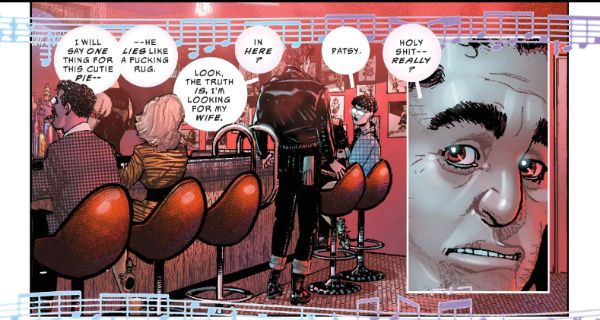 MIDNIGHT OF THE SOUL by Chaykin, Arbutov and Bruzenak
MIDNIGHT OF THE SOUL by Chaykin, Arbutov and Bruzenak
Joel’s a failed writer but a successful drunk who slouches despondently in the garage of a house he sold to his Brother-in-Law to clear debts accrued, pecking out unwanted alt-History tales of a World where Germany won WW2. If Joel punched himself every time he ate a bagel he couldn't be more obviously a self-hating Jew. He doesn’t hate himself because he's a Jew though, he hates himself for some unpleasantness which occurred during the liberation of a Concentration Camp in WW2. Something, as Joseph Heller famously had it, happened. Coming to terms with that memory is Joel's key to Grace, but to do it he'll have to navigate his 'Midnight of the Soul'. Meanwhile, just to underline his emasculation, his wife is out bringing home the bread working as a night-court stenographer. Except she isn't, as Joel finds out while pathetically creeping the house for booze. Turns out she's turning tricks. The lit match of his self-righteous indignation plops straight into the accumulated reservoir of self-hatred, and the resulting explosion of dumb machismo is sufficient to propel the cuckolded schmuck out into the city in search of vengeance. New York, however, has other ideas. 'Midnight of the Soul' is a picaresque adventure comic in which a man finds out a lot of the things he thought he knew about himself aren't true, and that the truth might hurt but not as much as living a lie does. Also: violence, jazz, profanity, blow jobs, snappy patter, racism, jokes and a man dressed as a baby in an Irish bar. 'Midnight of the Soul' has something for everyone! Except humourless drips.
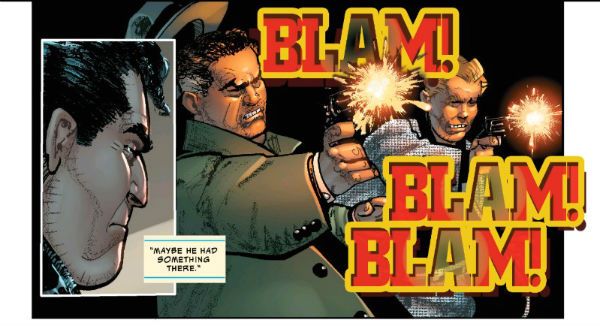 MIDNIGHT OF THE SOUL by Chaykin, Arbutov and Bruzenak
MIDNIGHT OF THE SOUL by Chaykin, Arbutov and Bruzenak
Joel's a luckless boob for the most part, but he is ultimately lucky because he gets to inhabit one of Chaykin's more vital narratives. From the first loaded word (“Parallels”) there’s a sense of Howard Victor Chaykin pushing through the pages of the narrative at the reader. The explicit fictional narrative of the book seems shaken every now and then by subsurface ructions, barely repelled authorial outbursts, which threaten to make it lose its footing. Which it never quite does, but it comes close. There’s a lack of commitment to the pulp fiction on show, as though Howard Victor Chaykin is intermittently is gripped by the urge to be doing something else. And I think he probably is. In a sense 'Midnight of the Soul' works as a big kiss-off to a bunch of tropes you suspect Chaykin feels he’s outgrown. Joel enters a midnight world of Chaykin standards, but always at an odd angle, always a few beats behind thee action, always playing catch-up, as though trying to find his way into the story proper. A story which seems to be occurring in parallel(!) to his search. This story, the story Joel circles for the bulk of the book, is the “usual” Chaykin, the Chaykin we expect; all bad behaviour, colourful characters, sassy patter and blunt force violence. For much of the book Joel never quite connects with this pulp strand, instead he keeps bouncing off it into a more sedate but no less colourful screwball romantic comedy. Both strands hinge on a portrait of New York anchored by visual verisimilitude and the odd nod to reality (is that Joe Gould reciting 'The Face on The Bar-room Floor'? In #3?) but both run parallel(!) to each other; until the final pages, anyway. And it's on these final pages that Chaykin seemingly states his current genre preference. But is it “Goodbye” or just “Au Revoir” to the genre staples that made his name and brought him fame? Alas, despite what I tell ladies in bars, I don't know Howard Victor Chaykin personally, so we'll all just have to wait and see together...
NEXT TIME: Take a guess, punchy. That's right - COMICS!!!












